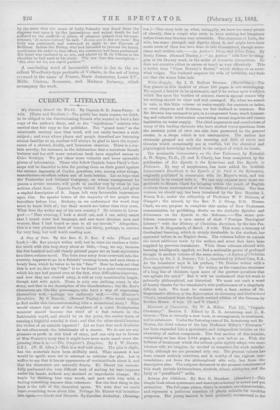A Day of Fate. By the Rev. C. P. Roe.
2 vols. (Ward and Luck.)—Mr. Roe always writes well, but ho tries his readers a little too much with this long story about so little,—long, we say, because the five hundred and odd closely printed pages are at least equivalent to a three-volume novel. The hero runs away from overwork into the country, happens to go to a Friends' meeting-house, and sees there a lovely face, which ho takes to be his "fate." How he finds out that this is not so, that his " fate " is to be found in a quiet countenance which his eye had passed over at the first, what difficulties intervene, and how they are cleared away, is told at very considerable length, though told with spirit. There is only ono etrikieg scene in the story, and that is the description of the thunderstorm ; but Mr. Roe's characters are life-like personages, who have a way of expressing themselves well,—perhaps too uniformly well.—The Minister's Daughters. By S. Francis. (Samuel Tinsley.)—Who would expect to find under this innocent-sounding title a sensational story ? Who would expect that ono of the daughters of a quiet Presbyterian minister should become the chief of a fast coterie iu the fashionable world, and should be on the point, the reader fears, of causing a frightful scandal in that ; and that the other should become the victim of an amiable bigamist ? Let us hope that such destinies do not often await the inhabitants of a manse. We do not see any pleasure or profit in this kind of story, and can only say in favour of Alin Francis's story that it might have boon made much more dis- pleasing than it is.—The Conjuror's Daughter. By J. W. Sherer, C.S.I. (W. H. Allen.)—This is a well-told story. The plot is slight, but the materials have been skilfully used. What interest it has would be spoilt, were we to attempt to criticise the plot. Let it suffice to say that it has an appearance of verisimilitude about it, and that the characters are naturally drawn. Mr. Sherer has success- f ally performed the very difficult task of making his hero improve under his hands, without any strained or improbable change. We begin by disliking him very much, and part with him with a feeling something warmer than tolerance, But the best thing in the book is the talk of the theatrical agent. Wo wish that wo could learn something more about him. Perhaps Mr. Sharer will introduce him again.—Cords and Discords. By Caroline Atchorloy. (Riming- ton.)—This story tolls us, what, unhappily, we have too many proofs of already, that a couple who seem to have nothing but happiness
before them may become very miserable. The character of Leila, the
wife, has some strength and dignity about it, and might have been made more of than has been done in this ill-contrived, though some- times well-written tale.—An Author's Story, and Other Tales. By
Emily Foster. (Samuel Tinsley.)—" An Author" tells how he drug- glee at his literary work, in the midst of domestic distractions. He does not contrive either to amuse or touch us very effectively. This is better than " Clara Ifornby's Secret," which strikes us as some- what vulgar. The husband suspects his wife of infidelity, and finds out that she wears false hair.


































 Previous page
Previous page